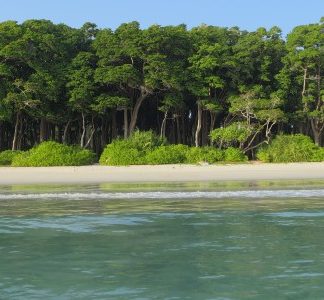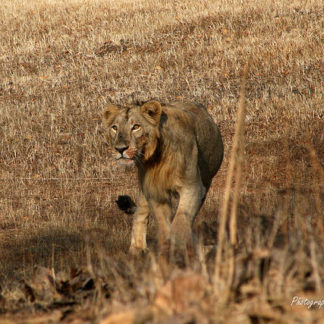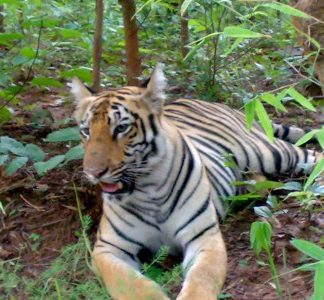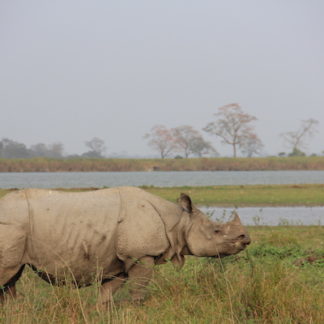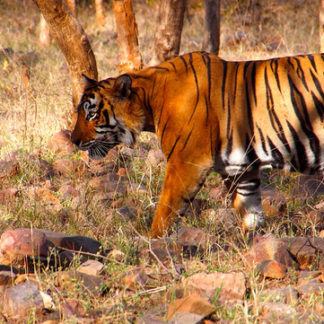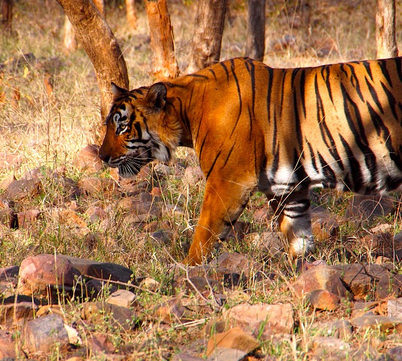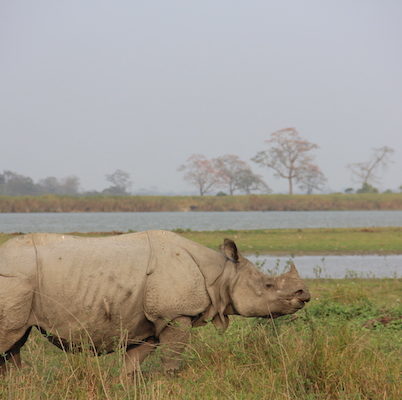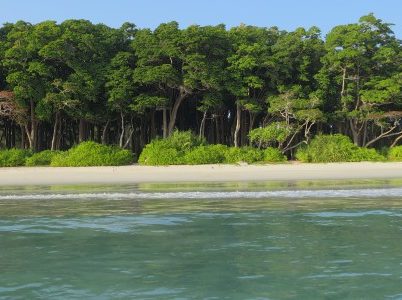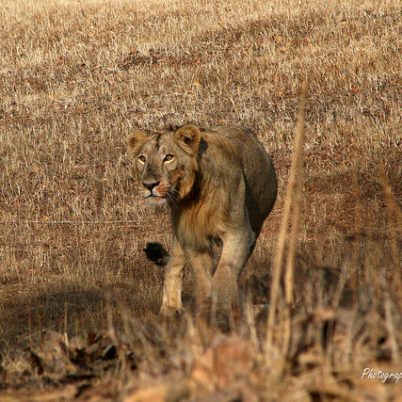The Best Places for Nature Photography in India
If you are a nature and wildlife photography enthusiast, India is just the place for you. The country has abundant national parks and sanctuaries. It’s no wonder, that it’s one of the most preferred destinations for wildlife photography tours! From giant Asiatic elephants to the roars of the tiger, India’s wild side offers you an excellent opportunity to test your photography skills and capture nature at its rawest. Here are some of the destinations you must visit if you’re looking for the best photography tours in India.
Jim Corbett National Park, Uttarakhand
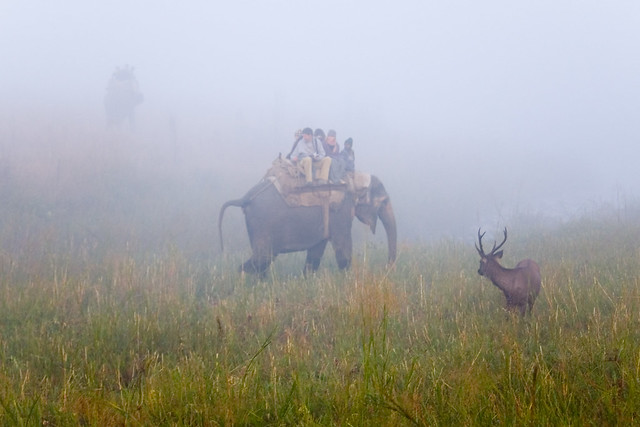 Deep into the habitat of Jim Corbett National Park. Credit: Peter Davis
Deep into the habitat of Jim Corbett National Park. Credit: Peter Davis
Located in Uttarakhand, Jim Corbett National Park is one of the best places for nature photography in India. Name inspired by of the foremost tiger conservationists in India, it is home to the royal Bengal tiger. Along with them, you will find leopards, sloth bears, red foxes and many other animals, as well as a stunning landscape at the base of the Himalayas, full of lush forests, plentiful waterbodies and grassy plains. This is also one of the best destinations in India for bird-watching, with plenty of resident and migratory birds alike to spot and photograph.
Best time to visit: Corbett is best visited between November and June.
Getting there: The park is well connected by road and rail to Delhi, Manali, Moradabad and others.
Club this with Corbett is easy to visit on a trip around North India, especially if you’re also interested in seeing the Himalayan towns of Dharamsala or Rishikesh.
Kaziranga National Park, Assam
Known for “the big five” – rhino, tiger, elephant, wild buffalo and swamp deer, Kaziranga is a perfect place for wildlife photography tours. The national park is located in Assam and is famous for bears, leopards, and several species of local and migratory birds, but the biggest attractions remain the endangered one-horned rhino. Kaziranga is also a UNESCO-listed World Heritage site for its Eastern Himalayan biodiversity.
Best time to visit: Head to Kaziranga between November and April to see it at its best. Getting there: The easiest way to get there is to fly to Guwahati, and then drive down.Club this with: India’s Northeast is incredible, and not as popular with international tourists – you could easily spend a week or two in the region. If you want more nature, you can also go to nearby Nameri National Park. Get in touch with us, and we’ll help you plan your trip!
Gir Forest National Park, Gujarat
Gir Forest National Park is the last wild refuge of the Asiatic lion. If that’s not enough reason to visit, its unusual landscapes also make it one of the best places for nature photography in India. Apart from the lion, you might also get a chance to spot and photograph animals like sambar, chinkara, chital, porcupine, wild boar, black buck and a variety of avifauna as well.
Best time to visit: The best season to visit is around December to March.
Getting there: The park is well connected by road to Rajkot, if you wish to fly. You can also take a train to Junagadh Station, and a car from there.
Club this with: The state of Gujarat has plenty to offer, whether you’re interested only in nature, or culture and history as well. You can make your way up towards the Rann of Kutch to see the great Indian bustard and wild ass, as well as the dramatic salt plains. You can also go to the Banni Grasslands on the borders of the Rann! Get in touch with us for more help with planning a wildlife and nature photography tour in the area.
Sundarbans National Park, West Bengal
The Sundarbans National Park offers a very unique wildlife experience. It is home to our very own national animal – the Bengal tiger, along with saltwater crocodiles, wild boars, foxes, leopards, turtles, the Ganges river dolphins and several other varieties of mammals and reptiles, along with a huge variety of local and migratory birds. One of the specialities of this park is that the only way to travel around and across the park is by boat; no jeep safaris here! These wetlands, formed by the delta of the Ganges, offer spectacular photography opportunities.
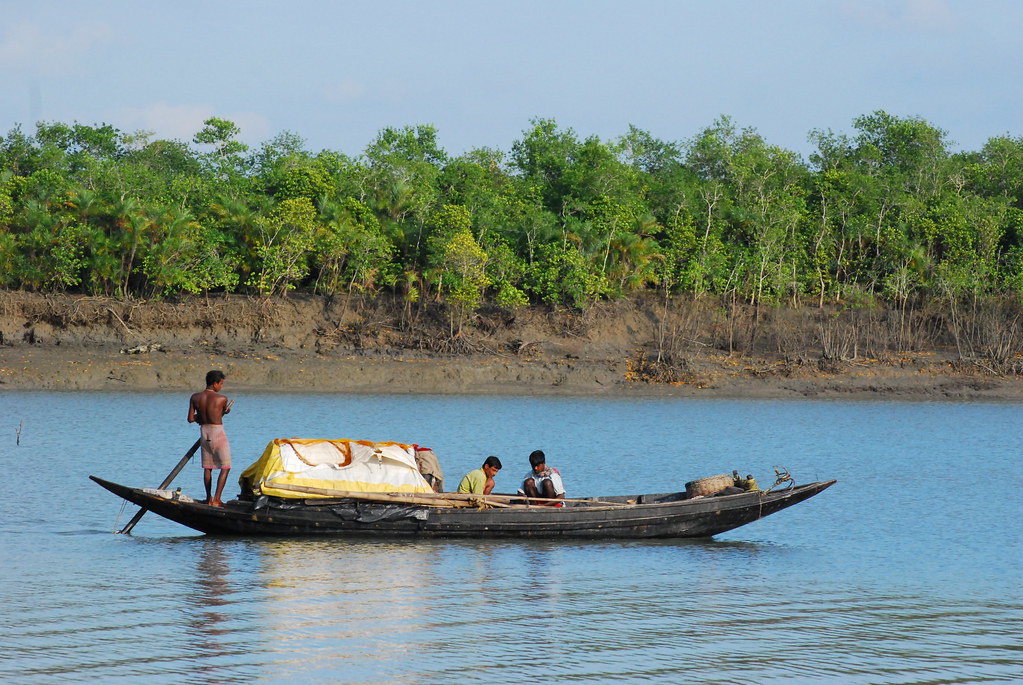 A glimpse of the Sundarbans. Credit: Sayamindu Dasgupta @Flickr
A glimpse of the Sundarbans. Credit: Sayamindu Dasgupta @Flickr
Best time to visit: The Sundarbans are at their best from November to February.
Getting there: Gosaba is the nearest town, from where it is connected by road. Visitors can also take the motorboat from Canning, which is the nearest railway station.
Club this with: There’s plenty to see and do in this part of the country – you can go up to the tea plantations of Darjeeling, explore the colonial architecture in Kolkata, and even head further north towards Sikkim! Get in touch with us for help planning your personalized holiday in India.
Satpura National Park, Madhya Pradesh
Located in the very heart of India, Satpura National Park is home to leopards, wild boar, bears, black buck, several kinds of deer, and several species of birds apart from, of course, the tiger. But one of our favourite species to spot and photograph here are the barasinghas or swamp deer.
Best time to visit: You can expect to have a good time in Satpura between October and April.
Getting there: The nearest town, Pachmarhi is well connected via road. The nearest railway station is Piparia, also well connected by road.
Club this with: Madhya Pradesh has some of the best wildlife photography to be found in India – you can link a few of the national parks together on a two-week itinerary that’s full of nature and wildlife! Get in touch and we will help you figure it out.
Eravikulam National Park, Kerala
The gorgeous Eravikulam National Park is one of the best places for nature photography in India. Located amidst the natural beauty of Munnar, the park is famous for the endangered Nilgiri Tahr. It is also home to elephants, deer, jackals, leopards, otters, mongoose, and a huge variety of birds and butterflies. The highest peak in South India, Anamudi Peak, lies in the park’s southern reaches, and once every 12 years, is covered in a stunning deep blue as the neelakurinji blooms. The last bloom was in 2018.
Best time to visit: Visit between September – January or April – June, as the park stays closed for the calving season of the Tahrs (typically between January and March) and can be tricky to access in the monsoon months.
Getting there: Eravikulam’s a mere 15km from Munnar and is easy to get to!
Club this with: There’s no reason why you can’t include this national park on an itinerary across Kerala. You can spend a few days here while in Munnar, and also go to the backwaters along the coast. We can help you plan your next Kerala holiday – get in touch!
Pench National Park, Madhya Pradesh
If you want to photograph tigers, Pench National Park definitely claims a spot on India’s best wildlife photography tours. This is one of Madhya Pradesh’s prime wilderness areas. You’ll be able to see deers, elephants, wild boars, wolves, sloth bears, leopards, foxes, striped hyenas, and much more. Along with wildlife photography trails, you can even go on an adventurous nature walking trail. This is a great time to photograph smaller details!
Best time to visit: The best time to get there is between November and May.
Getting there: Seoni, the closest city, has a train station with links across the country. You can also fly in to Nagpur and drive down.
Club this with: If you want to keep your trip nature and wildlife focused, you can chart an easy itinerary across Madhya Pradesh’s many wildlife reserves. Get in touch, and we can help you plan your trip!
Sariska National Park, Rajasthan
The stark, novel landscapes of this national park make Sariska a haven for nature and wildlife photography. Wild residents here include striped hyenas, wild boars, jackals, serpent eagles, monkeys, hares, as well as several varieties of deer, apart from a few big cats.
Best time to visit: The national park is open between October and May, and is best explored in the winter months.
Getting there: The park is well connected by road to Hindaun, Jaipur, and Delhi.
Club this with: You can visit this smaller park on a holiday itinerary across north India that includes Delhi and Rajasthan. Nearby attractions include the Neemrana Fort Palace and the town of Bhangarh. It has a reputation of being India’s most haunted locales.
Kanha National Park, Madhya Pradesh
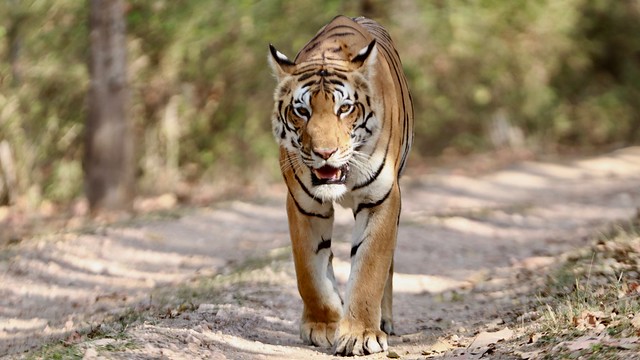 If you’re lucky, you’ll chance upon one of these magnificent Tigers at Kanha National Park. Credit:
If you’re lucky, you’ll chance upon one of these magnificent Tigers at Kanha National Park. Credit:
Kanha National Park is one of the most beautiful national parks in the country. With open grasslands and plentiful tree cover, Tiger safaris here are the most famous.You can also see elephants, jackals, leopards, striped hyenas, monkeys, and several varieties of deer including black buck, swamp deer, chital, and sambhar. This is another great place at which to spot the majestic barasingha!
Best time to visit: Head to Kanha in the winter or early summer; the park is open between October and July.
Getting there: Nagpur and Jabalpur are the two main hubs by the park’s gates, and both have airports as well as train stations.
Club this with: Kanha’s location makes it easy to visit on a holiday itinerary of both north India or west and South India. Get in touch with us and we will help you plan your wildlife photography trail!
Ranthambore National Park, Rajasthan
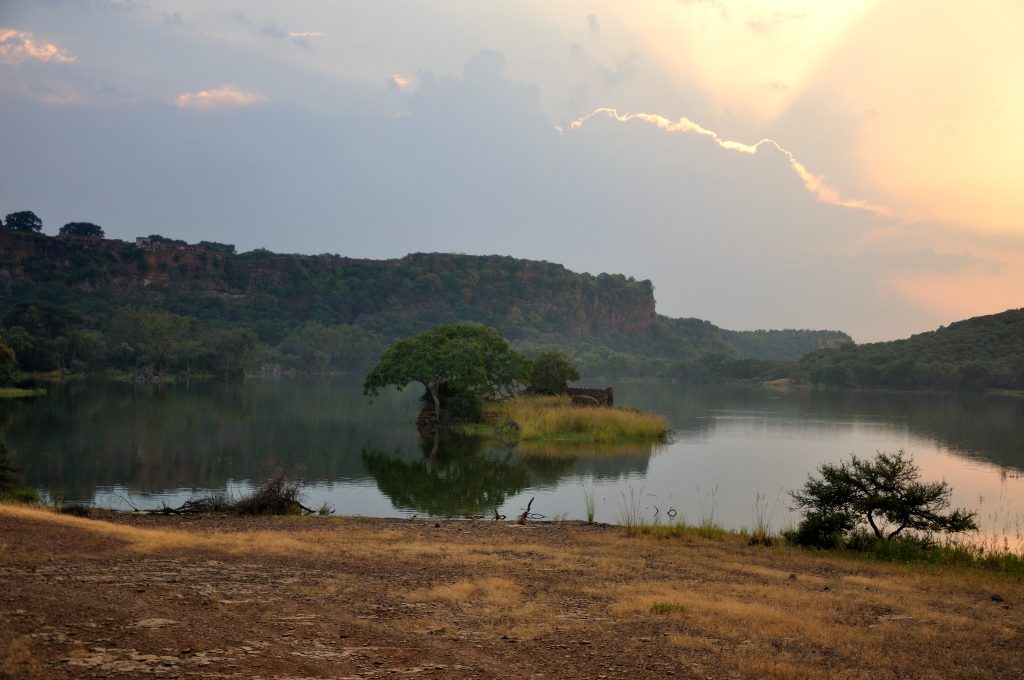 Credit: Amit Rawat @Flickr
Credit: Amit Rawat @Flickr
Ranthambore is one of India’s foremost wildlife reserves. It is home to a large population of the tiger. One of the most historic parks in India, it was once prime hunting grounds for the erstwhile royalty.
Dhak tree, called the ‘flame of the forest’ forms a large part of this forest’s cover. When the flowers bloom, it’s truly a sight to behold! Apart from tigers, you might also spot bears, leopards, jackals, elephants, hyena, monkeys, different types of deer and snakes here.
Best time to visit: The winter months are when the park is most pleasant, but if you visit as the summer sets in, you are more likely to spot wildlife around the watering holes!
Getting there: Sawai Madhopur is the closest town, and it has a train station. You can also drive across from Jaipur, which is about 200km away.
Club this with Ranthambore is the perfect addition to any Rajasthan and North India itinerary. It’s easy to access from Jaipur, in particular.
If you’re looking for guidance for a wildlife photography trail across India, get in touch with us!
helping you travel your way
Everything you need to know about India is here We have tried writing about everything you may need help with for your trip to India, If you need help in planning a trip to India Get in touch with us to to plan your trip of a life time.

